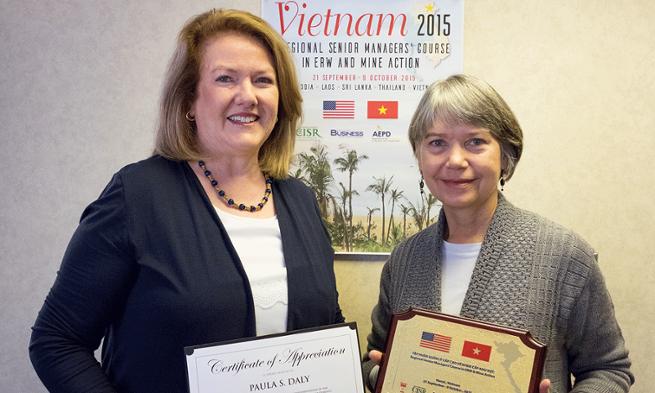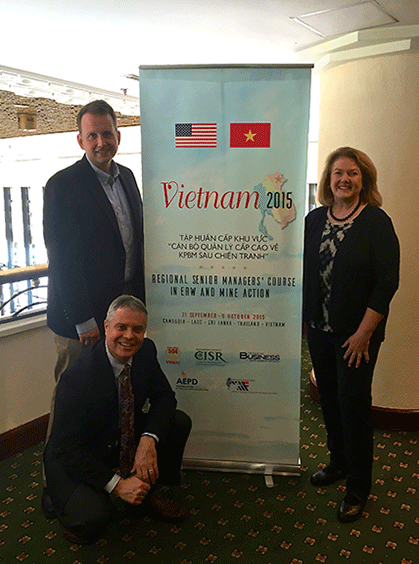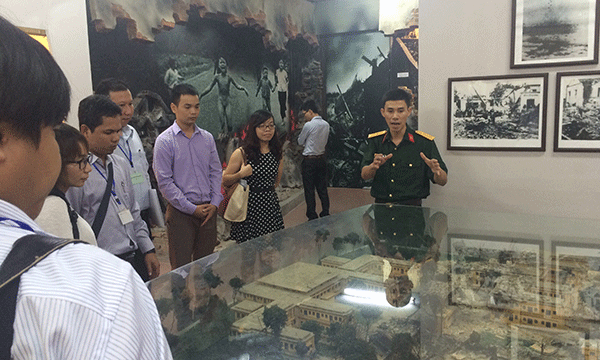Managing renewal
Nation and World
SUMMARY: For a decade, College of Business faculty members have collaborated with colleagues in CISR, the Center for International Stabilization and Recovery, to train senior level managers in organizations that deal with landmines and explosive remnants of war. These organizations are a crucial element in the recovery and rebuilding of post-conflict societies.
College of Business professors teach management skills to help organizations involved in rebuilding post-conflict societies
What do you need to build a profitable, thriving business? Experts often point to management skills—the ability to lead and work with others, solve problems, organize and strategize effectively.
A group of JMU professors have looked beyond the traditional boundaries of business to find applications for these managerial tools in ways both unexpected and remarkable.
For a decade, College of Business faculty members have collaborated with colleagues in CISR, the Center for International Stabilization and Recovery, to train senior level managers in organizations that deal with landmines and explosive remnants of war. These organizations are a crucial element in the recovery and rebuilding of post-conflict societies.
'We get people from different countries and different organizations talking together, sharing their knowledge, sharing ideas, disagreeing, sharing their expertise.'
Known as the COB International Training Group, their modus operandi is straightforward. “What we emphasize is the transferability of what we’re teaching,” says Dr. Paula Daly, professor of management at JMU and Management Academic Unit Head. The ITG is made up of Management faculty members: Daly, Robert Eliason, Fariss Mousa, Fernando Pargas, Matthew Rutherford and Marion White. As ITG coordinator, Daly has planned and facilitated the management training for multiple Senior Managers Courses. The SMC projects have helped key managerial personnel from more than 40 countries develop and enhance the expertise needed to improve organizational performance. “We’re from the business world, but the skills and the knowledge we convey can be used to make any organization more effective and efficient,” she says.

"The SMCs embody JMU’s vision of being an “engaged university” and demonstrate the benefits of cross-campus collaboration, as CISR and Management faculty members work together to implement the courses," says Daly. SMCs held on JMU’s campus bring managers from various countries to the U.S. for training; and more recently, CISR and ITG have taken the training to regions of the world heavily impacted by land mines and ERW, such as Tajikistan and Vietnam. CISR Associate Director Suzanne Fiederlein says, “The course continues to evolve and remains the leading management training experience for those working in national clearance programs in ERW [explosive remnants of war] and mine-affected countries.”
In 2013, on average nine people a day worldwide became victims of land mines and explosive remnants of war—the vast majority were civilians and almost half of that number were children. But the need goes beyond caring for the people affected by landmine injuries. Countries often suffer the ill effects of conflict for years, even decades, after peace treaties are signed. Successful redevelopment on a national level requires people in key positions who know how to set goals, build an effective organization, manage a workforce, provide leadership and allocate resources wisely.
'They need what we teach in class every day—how to develop a strategic plan, exhibit good leadership and practice team skills.'
“The beauty of it,” says Daly, “is that they need what we teach in class every day—how to develop a strategic plan, exhibit good leadership and practice team skills.” Situational analysis has become a hallmark of the training. “We identify a situation and have participants examine it from a managerial perspective and then make decisions about the main issues that need to be addressed,” says Daly.
Each SMC draws representatives from a variety of countries; for instance a 2014 Regional SMC had participants from Afghanistan, Azerbaijan, Nepal, Tajikistan and Yemen. The 2015 SMC in Southeast Asia included participants from Cambodia, Laos, Sri Lanka, Thailand, and Vietnam. SMC coordinators make sure the cultural mix does not inhibit group discussion; in fact they work hard to foster the interchange of ideas. “There is a wealth of information and practical experience to be shared,” says Daly. “Discussion is a hallmark of what we do. We get people from different countries and different organizations talking together, sharing their knowledge, sharing ideas, disagreeing, sharing their expertise.” In short, it’s a model of civil discourse.

There are many benefits from the work: professional development for COB faculty, enriched instruction for JMU students, and increased visibility and recognition for JMU on a national and international level. There is also a powerful, fundamental benefit. By demonstrating the commonality that exists among people despite differences in culture, gender, language, and religion, the training furthers the acceptance of and tolerance for other ways of life, and fosters friendships among diverse participants.
Daly recalls one example: “During one of our courses, a participant told me ‘what makes me sad is that my country is not a place I can invite you to visit…but if you ever come, I would lay down my life for you.’”
While conflict continues to exact a weighty toll on individuals and societies, the efforts of Daly and her COB colleagues, CISR, and those they train offer hope. After all, any solution that allows wounds to heal and human endeavor to flourish bodes well for the future.
